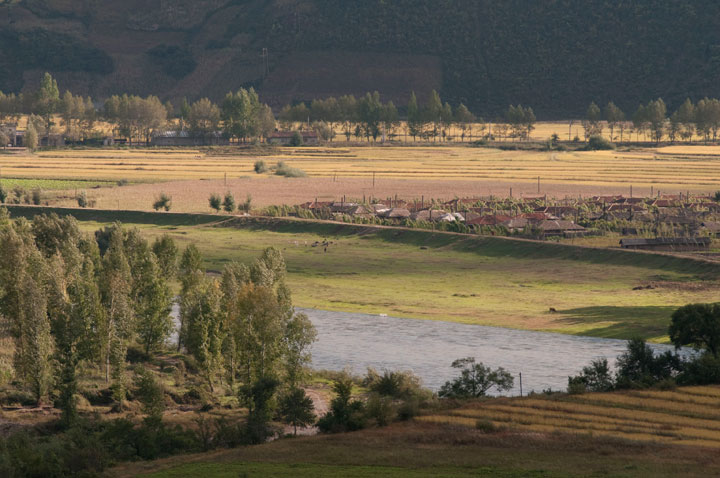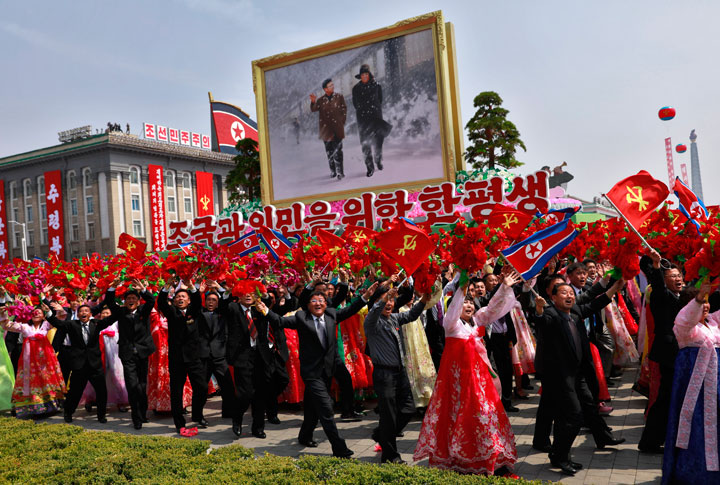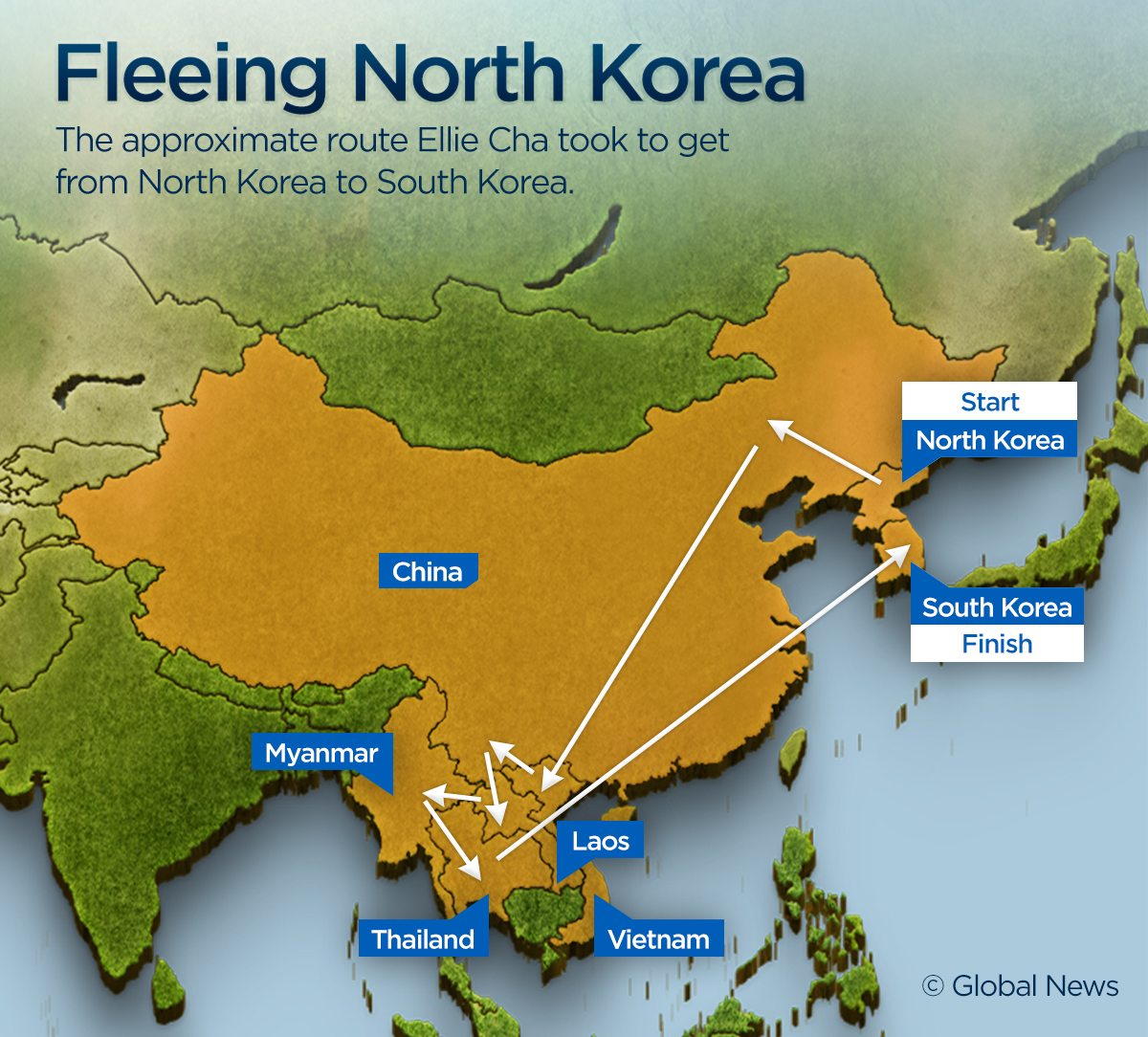Ellie Cha was 19 and just starting university when she left North Korea.

Her father, once a respected vice-president in a North Korean mining company, had just lost his job. An aunt had fled to China and the family was now regarded as potentially disloyal to the Kim regime. Her parents believed there was no future for them in North Korea.
“One morning they just said, ‘In the next few hours, we’re going to somewhere else.’”
It was the start of an arduous three-month journey across China and Southeast Asia to reach asylum in South Korea. Much of it was spent in prison cells.
Cha spoke to Global News in Ottawa, where she is currently taking part in a program with the advocacy group HanVoice, which promotes human rights in North Korea. As part of the six-month program, the 23 year old has spoken at universities in Ontario and Quebec and worked as an intern in the office of Senator Yonah Martin.
She told Global about her life in North Korea and her family’s escape.
Life in North Korea
Cha was born in the northern part of North Korea, near the border with China. Her town was relatively well-off economically compared to other parts of the country, she believes, and her father had a good job with a mining firm.
WATCH: North Koreans live in two worlds: ideological and real life, says defector Ellie Cha, and Westerners only see the ideological face that people can openly express.

As a child, Cha went to school and learned the same sorts of things a Canadian child might: reading, math, science – with a few differences. To start with, her history classes were almost completely wrong.
She learned that the Korean War was started by South Korea and the United States, for example, because it helped to promote the North Korean government’s story that their leadership helped to protect their country from invasion. “All of the education was focused on making loyalty for the government,” she said.
Lacking any other information, she believed the history lessons, she said. But she didn’t believe the more overt propaganda.
Every day before class, students were asked to take 10 minutes to compose a written reflection on some recent news, like the “heroes” who died after they ran into burning buildings to save a portrait of North Korea’s founder, Kim Il Sung.
“I couldn’t understand how people could sacrifice themselves for dead men. Not even for dead men, for his portrait,” she said. “Every morning when I heard these similar stories, I couldn’t understand. I couldn’t sympathize.”
And after school, she and her family would attend group meetings designed to instill further loyalty to the regime. All those amazing photos of parades on holidays or celebrations in honour of the leaders are the result of months or even years of forced practice, she said.
Growing up, Cha was aware of limitations placed on her family’s success. North Korea’s government has a social system that ranks people based on their perceived loyalty to the regime and doles out economic and social privilege accordingly. The rank can go back several generations and can be affected by the actions of family members.

Get breaking National news
Because Cha’s family had relatives in China, they were already regarded with some suspicion. This meant that her father could only be promoted so high at work, she said.
But after her aunt disappeared and was spotted in South Korea, her father couldn’t keep his job in the mining firm. He had to take a lesser job elsewhere, with implications for what his children could achieve.
“My parents realized that for my family, there is no future anymore, especially for me and for my brother,” said Cha.
So in 2012, they left.
Almost no North Korean defectors cross directly from North Korea into South Korea. The border is too well-guarded and it can be hard for ordinary North Koreans to travel around within their own country. So most people, especially those like Cha’s family who live near the border, cross into China.
But it’s hard for them to stay there. Because China has a relationship with North Korea, fleeing North Koreans are often caught by Chinese authorities and sent back home to face terrible punishments, including work camps or prison.
Instead, North Koreans typically head through China into Southeast Asia to find a South Korean embassy, where they can claim asylum and apply for South Korean citizenship.
Cha’s family paid Chinese brokers to smuggle them across the border, one by one. Cha was reunited with her father and 12-year-old brother in China, but their ride wasn’t waiting for them when they arrived. So, Cha’s first night of freedom was spent outdoors, on the side of a mountain.
After two days of cold rain on the mountain, their Chinese contact arrived and took the family to meet their mother, then they spent six days driving south through China by bus, eventually reaching Vietnam.
“During that time it was very scary for us, because we knew that if we were caught by Chinese authorities, they would send us to North Korea,” she said. “And strong punishment would await us in North Korea.”
WATCH: North Korean defector Ellie Cha describes the moment she realized that Vietnamese authorities were sending her family back to China.

They intended to go to the South Korean embassy in Hanoi, but were arrested by the Vietnamese police before they could get there. They spent three weeks in Vietnamese jail cells. After much confusion, they were sent back to the Chinese border.
Cha was afraid.
“I grabbed a police officer’s hand and I said, ‘Please. Take us to Laos.’ He looked at me with very apologetic eyes and just said, ‘Sorry for that. We are taking you to China.’”
Her father’s face went white at the news, she said. “He collapsed onto his knees and said, ‘Please, please, for the kids, for the children.’”
Cha’s father had always been a hero to her, she said, and respected by others. To watch him beg was heartbreaking. “Literally, I felt sick in my heart when I saw my dad.”
Her father told her to go on alone if she had to.
WATCH: North Korean defector Ellie Cha says she felt heartsick watching her father beg police not to send her family to China during their escape from North Korea.

“I wasn’t scared to suffer myself,” she said. “I heard some stories about how people suffer in North Korea when we go to a political prison camp. So when I imagined my parents’ life, my brother’s life, it was much more suffering than just myself. I could decide to go by myself, but what about my parents and my brother?”
They were eventually released back into China, and tried again. They went through this five times before trying a different route through Laos, Myanmar and Thailand, where they finally ended up in a refugee camp and were able to contact the South Korean authorities.
The family had travelled thousands of kilometres through China and Southeast Asia to find asylum, but it was a tough journey. “One day my brother said, ‘I feel like I travelled East Asian jails.’”
Life in Seoul
Life in South Korea wasn’t as easy as they hoped.
“People say that when you arrive in South Korea, maybe it will be a happy ending. Even in South Korea, our journey didn’t end. Maybe the journey for freedom, not the journey for a good life as a family.”
Her father had difficulty finding work as an older man, her mother sank into depression and Ellie and her brother had problems fitting into their new lives.
“Even in South Korea, we have to overcome lots of challenges,” she said. “Such discrimination, such bias, and to adapt to a completely different society, social system.”
WATCH: North Korean defector Ellie Cha says she misses her friends and her hometown, and is thankful her father brought along photos of her childhood.

Her brother got into fights in high school because his North Korean accent identified him as an outsider, she said.
And when she wanted to go to university – South Korea has affirmative-action programs for defectors – one of her counsellors didn’t want her there.
“When I said I applied to Korea University, he said, ‘How can North Korean students go there? It’s not easy for South Korean students,” she recalled. “How can you study there? All of the students are super-smart.”
But Cha wanted to study. “I just said, ‘Why? How do you know about me? We just met now, just three minutes ago. You are a teacher. As a teacher, is it right to judge students by their social background?’”
It took three years for the family to settle in.
As a journalism student in Seoul, she got to know another student who had visited Canada with HanVoice and took the opportunity to come too. She wanted to learn, to see the world, and to help people understand about North Korea to help people back home.
She believes Canadians and Westerners confuse North Korea’s public face – with its robotic propaganda and seemingly fanatical devotion to Kim Jong Un – with what people really think.
“I think there are two worlds: the ideological world and our reality world. In order to live in North Korea, we have to participate in the ideological world and we have to pretend that we have loyalty for the regime,” she said.
“People ask me, ‘Do you love Kim Jong Un?’ But it’s just in the ideological world. It’s not our reality world.”







Comments
Want to discuss? Please read our Commenting Policy first.